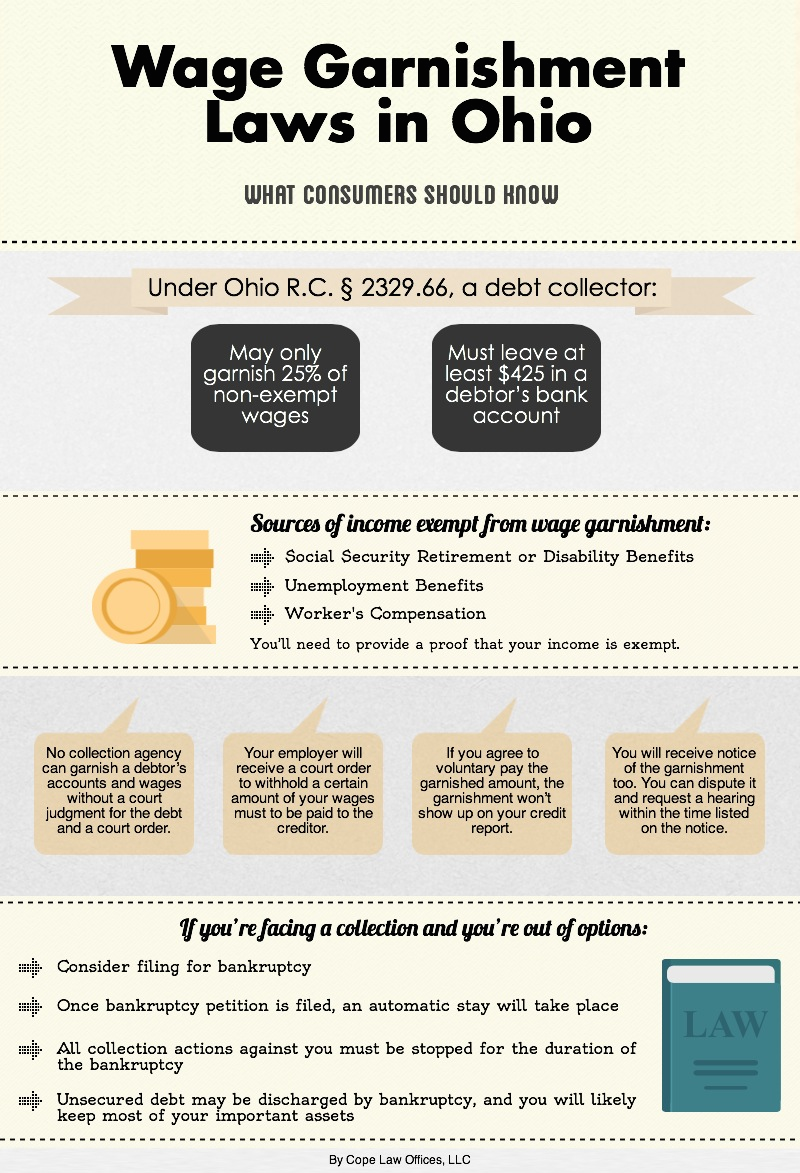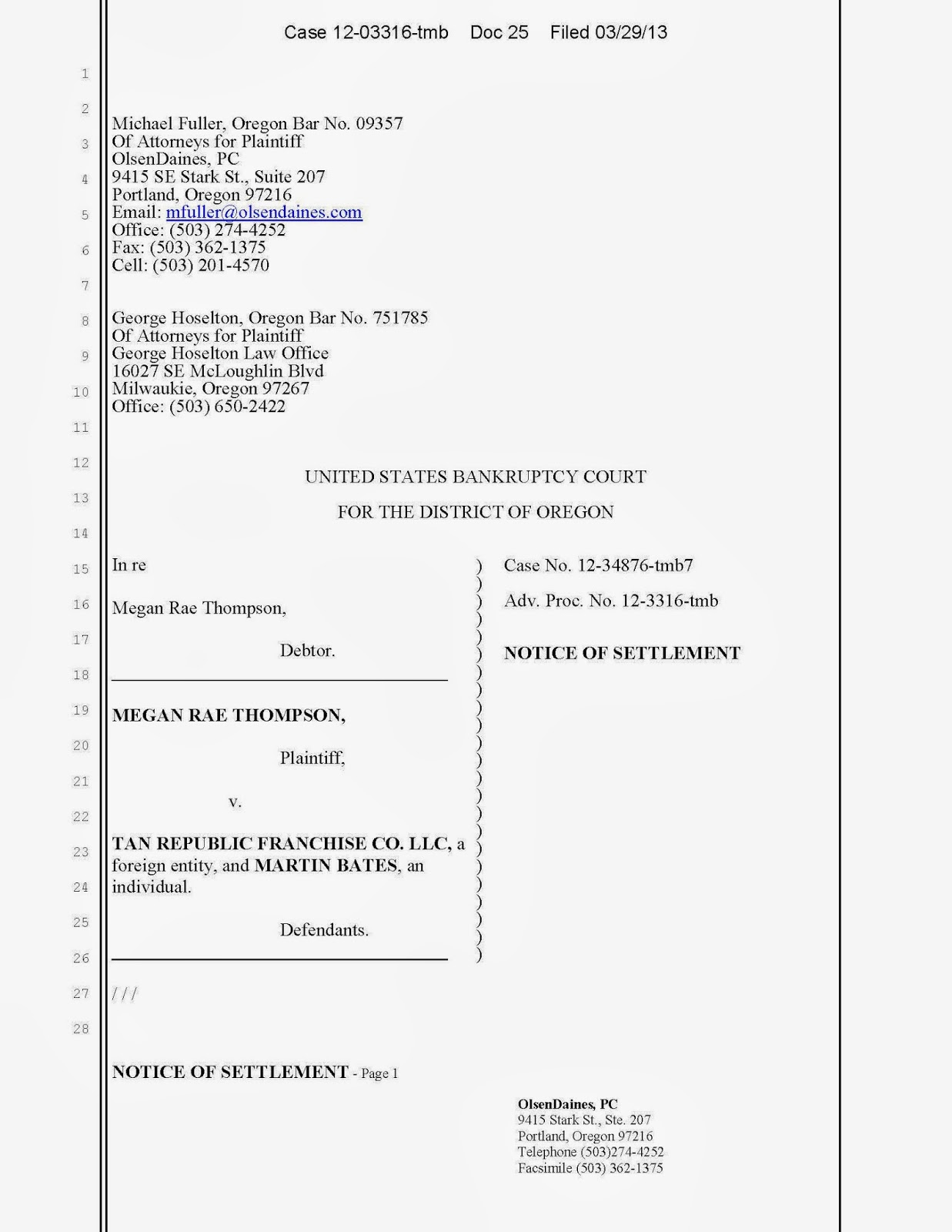Wage garnishment is a legal method of debt collection available in certain circumstances. For example, an employer may withhold the earnings of an employee under a court order because the employee failed to pay child support.
Ohio Wage Garnishment Process. In Ohio, most creditors must get a court judgment to garnish your wages. Federal and Ohio state laws limit how much of your disposable income can be garnished each week. Your disposable income is the earnings you take home after required deductions
Wage garnishment is a legal procedure by which an individual's earnings are withheld to repay a creditor. Wage garnishment takes place after the creditor has filed a civil lawsuit, and been granted a judgment against the debtor in court. In some cases, however, a court order is not required.
Wage garnishment lets creditors get repayment directly from your paycheck or bank account. Wage garnishment is usually the result of a court judgment. Here's how it works and what to do if you're facing wage garnishment.
IRS wage garnishments are one of the most damaging and aggressive of the IRS collection tactics. The IRS can seize 50-75% of your pay, leaving you with barely enough to cover basic necessities. For the self-employed, the IRS sends the wage garnishment to the taxpayer's customers.
Wage garnishment can create a lot of paperwork for your employer, and if you have more than one garnishment in a year you may lose your job. If you do nothing in response to the demand letter, the creditor will begin court proceedings to garnish your wages until the debt is paid in full.
Ohio Garnishment Exemptions and Non-Exemptions. Before getting to Ohio exemptions—or types of income sheltered from garnishment—there is a broad federal exemption: Social Security can only be garnished for child support, alimony, and certain federal debts, such as taxes.
A full time minimum wage worker in Ohio working will earn $ per week, or $19, per year. Ohio's minimum wage rate as of f, 2022 is $ per The minimum wage applies to most employees in Ohio, with limited exceptions including tipped employees, some student workers, and other
Ohio wage garnishment exemptions. How bankruptcy can help. When Can Creditors Garnish Your Wages in Ohio? Our attorneys can help you find out how to stop wage garnishment in Ohio in the manner that is best for your individual situation.
A wage garnishment is the withholding of a portion of a debtor's wages that are used to payoff a judgment. To pursue garnishment of a debtor's wages, a landlord must first get a judgment for damages against the tenant. "Damages" is a general legal term which encompasses unpaid
Businesses at some point typically encounter wage garnishments for child support, federal and state tax levies, credit garnishments and student loan garnishments. It is important to keep your financial records accurate by documenting these garnishments in QuickBooks. While laws vary ...
Wages. Wage garnishment, the most common type of garnishment, is the process of deducting money from an employee's monetary compensation Employers receive a notice telling them to withhold a certain amount of their employee's wages for payment and cannot refuse to
But what, exactly, is wage garnishment? How does it work? And how much of your wages can debt collectors take in your state? If a debtor doesn't spend their full paycheck and accumulates more than $1,000 in wages, they can't continue claiming the exemption.
Wage garnishment is a legal method to collect money owed to another party when other efforts to collect the debt have failed. When a debtor has been found liable for a debt, such as child support payments or court-mandated damages, and has failed to pay the required amount, you can ...

bankruptcy debt discharge asset stop collections collector injunction attempted garnish wages discharged management based
To learn how wage garnishments work, see Wage Garnishments: An Overview . Federal Wage Garnishment Limits for Judgment Creditors. Up to 50% of your disposable earnings can be garnished to pay child support if you are currently supporting a spouse or a child who isn't the
In wage garnishment cases, the creditor will contact your employer and have your employer deduct a Therefore, a single writ of garnishment can continue to garnish wages until the full amount of the debt How Can a Creditor Garnish My Wages? Most creditors will not be permitted to seek a

Ohio wage garnishment laws limit how much judgment creditors can take from your paycheck. Updated by Amy Loftsgordon , Attorney. A " wage garnishment ," sometimes called a "wage attachment," is an order requiring your employer to withhold a certain amount of money from your
Avoiding Wage Garnishment: Debt Repayment and Credit Counseling. How to Stop Wage Garnishment in Ohio. In Ohio, a debt collector may only garnish up to 25% of your non-exempt wages and must leave at least $425 in your bank account.
Federal limits apply for how much money can be garnished from wages in Queen Anne's, Kent, Worcester, and Caroline counties. Ohio law prevents employers from terminating employees because of one wage garnishment in one calendar year.
Wage garnishments or seizures are an extreme collection method that creditors may use to recover money owed to them. Facing a wage garnishment can be incredibly stressful and overwhelming, and many people don't know what their rights and remedies are in the situation.
Ohio has wage garnishment laws that set forth when and how a creditor may garnish a debtor's wages. Wage garnishment is the legal process by which a creditor takes part of your wages from your pay check before you are paid, thus reducing your take-home pay.
Wage garnishment is one way creditors can collect debts without your help — they just go straight to your employer. What are your rights in regards to wage garnishment in California? How long does it take to garnish wages after judgment, and who can garnish wages?

bills medical hospital ira pay billing services fraser sherman updated july
A wage garnishment is any legal or equitable procedure where some portion of a person's earnings is withheld by an employer for the payment of a debt. Situations subject to wage garnishment: alimony, child support, the default of a student loan, unpaid taxes, and other consumer debts.
Some states outlaw wage garnishment. See examples to understand how the law works, and how to handle wage garnishment. Administrative Wage Garnishment & Offset. Creditors must obtain a judgment from a court before they may garnish a worker's wages.
Wage garnishment is a crippling method to repay debts. Through a court order or government agency, a creditor can force your employer to subtract a specified amount from each paycheck. How to Stop Wage Garnishment in California Examples of Wage Garnishment Contact OakTree Law.
How to stop wage garnishment for child support, avoid discrimination and, if necessary, have the child support amount adjusted. A parent's wages are usually only garnished for child support when they're severely in arrears—they haven't made full payments in several months.

garnishment wage ohio laws stop help
Debt Collection. Income Garnishment. Can you garnish someone's wages in Ohio? Payday lenders have tried to garnish wages by sending a garnishment notification to clients human Yes, Nevada can garnish your wages if creditors take you to court. There is a limit on how much a
In wage garnishment, creditors can legally require your employer to hand over part of your earnings to pay off your debts. In nonwage garnishment, commonly referred to as a bank levy, creditors can tap into your bank account. Garnishment often happens when a creditor sues you for nonpayment of

wages garnished

bankruptcy creditor notice settlement withdraw bank republic tan filed funds continued automatically
How wage garnishments work. Who can garnish your wages in Canada? There are some specific Ontario garnishment rules that you should know if you receive notice that your wages will be garnisheed. How much of my wages can be garnisheed?
2 How Wage Garnishment Affects You. 3 Who Can Garnish Your Wages? 4 Wage Versus Non-Wage Garnishment. What Is Wage Garnishment? Sometimes, people are afraid or intimidated to speak with a creditor once they have fallen behind on their bills.
